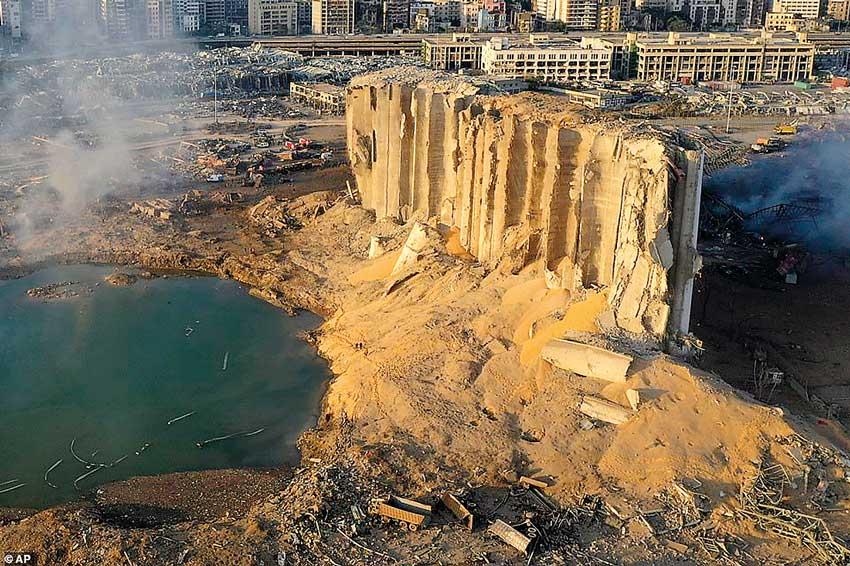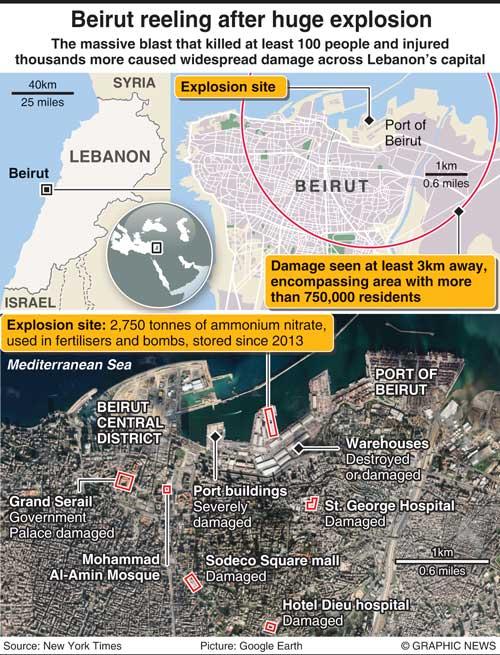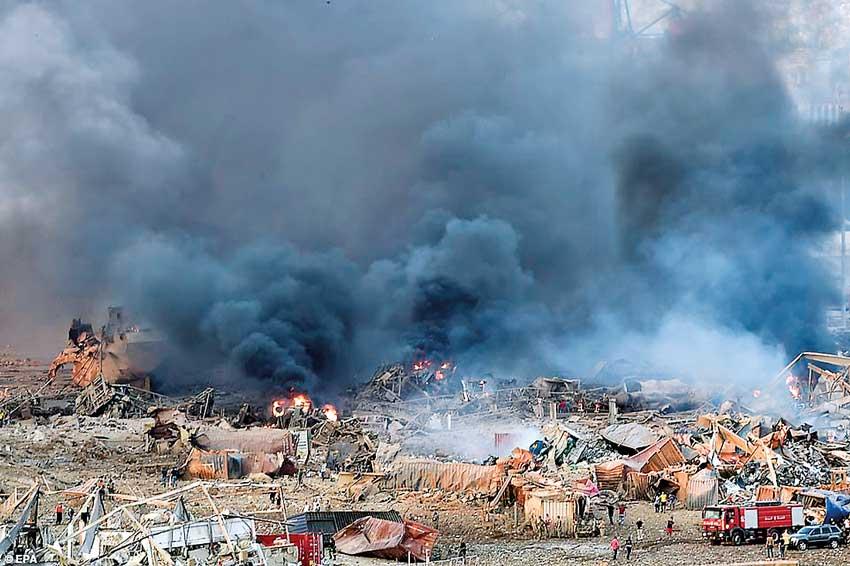06 Aug 2020 - {{hitsCtrl.values.hits}}

The port was almost completely destroyed in the explosion, blowing a reinforced concrete silo used to store grain to pieces (pictured) along with the surrounding buildings(DM)
The smell of smoke, blood and death dominated the port of Beirut on Wednesday as Lebanese army troops searched everywhere for possible survivors and more bodies under the wreckage.
“Stay away please. Wear two masks for your safety,” shouted a civil defence volunteer.
On Tuesday, a huge explosion went off at Beirut port, sending up smoke and a mushroom cloud-shaped shockwave that rocked the whole city and its outskirts, killing more than 100 people and wounding thousands.

The utter destruction is everywhere at the port, including the hangar that supposedly housed the 2,750 tonnes of ammonium nitrate that blew up after being stored there for years.
People felt the earth shaking under their feet before they saw the cloud coming. Lebanese seismologists said the blast was equivalent to a 4.3-magnitude earthquake.
Rescue operations were slowed overnight by severe power cuts Lebanon has been witnessing due to the lack of fuel.
Many likened the destruction to an “apocalypse.”
“We witnessed a civil war, we heard bombs before, but nothing like this,” said Sam Zeidan, an engineer, who was touring the Beirut port district and the Kartina neighbourhood which was badly damaged.
Not one building in the area surrounding the port escaped destruction.
In areas as far as 45 kilometres from the blast site, glass was shattered everywhere.
Shop windows were broken and shards littered streets located half an hour away by car.
“Our house walls fell, luckily me and my husband were out,” said Claude, who lives in the luxurious Sursock neighbourhood, which suffered massive damage.
A woman standing on her damaged balcony in the area was crying while shouting: “Our president, government and parliament should resign immediately.” “We are already going through bad days and this came to top it all,” said Mohammed al-Haj, who owns a stationary shop near the port.
Lebanon has been suffering since last year, when mass anti-government protests led to an economic crunch that was exasperated later by the coronavirus pandemic.
The currency lost more than 70 per cent of its value against the dollar since October 2019, when demonstrators took to the streets demanding reforms and accusing the ruling class of corruption. This has been described as the worst economic crisis Lebanon has seen since the 1975-1990 civil war ended.
Then Covid-19 hit, and Lebanon was forced to re-impose lockdown measures several times due to repeated rise in infections. Beirut port is the main artery of the country, as Lebanon imports most of its essential foods. Among other things, grain silos at the port were destroyed. Analysts like Makram Rabah predicts that this blast will deepen the economic struggles of Lebanon.

The explosion laid waste to the immediate surrounding buildings, and even wreaked havoc on districts miles away from the blast site (DM)
“If we look at the destruction of these silos, it means that we are heading for a hunger crisis and shortages of bread,” said Rabah, a lecturer in the Department of History at the American University of Beirut.
“We are ruled by corrupt rulers, we have coronavirus and now this. This is way too much,” said Pamela Hanna, who has lost colleagues in the blast.
“We are homeless. We are finished. I wish I had died,” shouted Lara, inspecting the damage inside her house, which faces the port.
She also insisted the blast was due to an attack, despite denials from the government.
“We heard a plane before the blast,” she said.
The cause of the blast is yet to be confirmed, but Premier Hassan Diab blamed it on a shipment of approximately 2,750 tons of ammonium nitrate, which has been stored in a warehouse at Beirut’s port for six years without safety measures.
He vowed that “facts about this dangerous warehouse that has been there since 2014” will be revealed.
Thousands of injured people packed Beirut’s hospitals, which were already suffering from shortage of material due to the economic crisis.
The head of the Private Hospital Syndicate, Suleiman Haroun, told dpa: “We are coping with the catastrophe and we managed so far despite the many, many wounded people who are still being treated inside emergency rooms and corridors.”
He added that three main private hospitals are currently out of service due to damage from the blast. The Red Cross said there are around 4,000 people injured, some of whom have serious injuries, indicating the death toll might rise. “This was like a death penalty,” an elderly man standing at the port said.
DPA, 05TH AUGUST, 2020
16 Nov 2024 18 minute ago
16 Nov 2024 50 minute ago
15 Nov 2024 15 Nov 2024
15 Nov 2024 15 Nov 2024
15 Nov 2024 15 Nov 2024